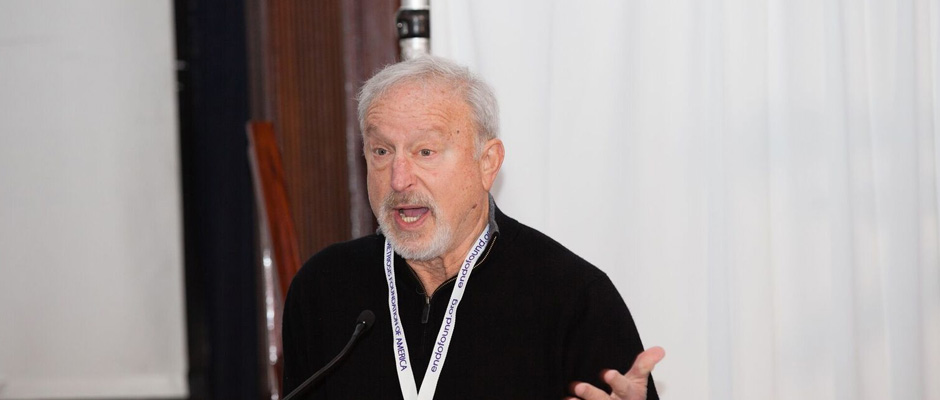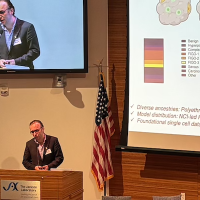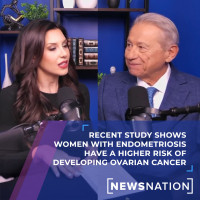PATIENT AWARENESS DAY 2018:
LIVING YOUR BEST LIFE WITH ENDO
Sunday, March 18, 2018, (8am-5pm) Einhorn Auditorium (131 E76th st) at Lenox Hill Hospital, NYC
Why and how can ACOG help? From a Historical Perspective to the Future
Harry Reich, M.D.
- Sorry, my legs are not the greatest these days. It's a great honor to be here. I still, I hope I didn't really, I taught you by doing besides just teaching by words, because I'm not much for words. Let me say, in our specialty, I'm known for laparoscopic hysterectomy more than anything else. That's why most gynecologists know the name. But the truth of the matter is, my true love, and most of my patients were for endometriosis, and I learned from, I believe, the best at that time, in the early 70s, from Robert Kissner in Boston, and I was able to do a couple rotations with him. And after that, I went into private practice. And I was lucky enough, I went to a town where my mother practiced medicine for many years and delivered lots of babies, so I had a lot of patients along that line, plus I inherited an infertility clinic with over, as part of a nurse midwife program, with over 100 active patients who had never been laparoscoped. So that was the state of the art then, as far as in communities throughout the United States, there was nobody who had even been laparoscoped, and where I trained with the master, with Robert Kissner, he was fantastic on all the ovarian work, but he would do very little in the cul-de-sac. Instead, he'd do a presacral neurectomy on everybody. So, we all became very good at doing presacral neurectomies, but the cul-de-sac was hidden. And this guy was capable. I mean, he could do gallbladders, he could do all the cancer surgery. But anyway, getting back to GYN. Incidentally, I'd like to just mention a little story that sort of eliminates GYN and our specialty. Our specialty's a fundie specialty, because you have obstetrics and you have gynecology, so people who are very interested in delivering babies, and you have people who are very interested in doing good surgery. But the problem is, very few train at surgery specifically, so, you know, the progress has been very slow. My wife had to go to, for a sinus infection the other day, to a regular doctor in our town, and walked into the office, and he had a nurse come in and give her a little anesthetic, just blow into each nostril. And he came in and he took a scope right off the shelf and he looked into her nose, which I was, I was sort of blown away by this. But anyway, he looked into her nose and he could see in one nostril, he could see purulent material. That's pus, yellow, coming out, that I would only see in pelvic abcess surgery. I'm thinking, my gosh, that's the ENT, where they come into a doctor's office to make the diagnosis, and come out knowing what's going on. In GYN, we still don't have that. A patient comes into the office and sometimes they're told when they have pelvic pain that the main problem is endometriosis. More and more commonly they're told that. And how do they know that? In most cases they don't. They treat the patient for pelvic pain. And this is a problem. My main topic is about ACOG, and the topic, I don't have it right here in front of me, but the topic was, the answer to the thing is ACOG, I don't think that is very interested. They have so many other areas, especially today in the present to worry about, so I don't see that. Except if all of you get going and really push, it's gonna come from, it's not gonna come from the doctors, it's gonna come from patients. I think that's what's gonna be necessary in our future. So, but anyway, in my own situation, I started doing excisional endometriosis surgery with, that was in the late 70s, and I was very fortunate that I had a dear friend, who was our pathologist, and he would tolerate all the specimens I would send down to the lab. He said, "Harry Reich runs the alphabet." That means I would get over 26 labs for a single endometriosis operation. When I was at Columbia, they said, the head of pathology said, "We only get paid for five specimens. "Please limit your, what you think might be, to five." That's New York, I guess. But anyway, my pathologist, and it was great, 'cause I would look at stuff, this was in the 70s, and I'd say this isn't scar tissue, and if I go down and look at it with a pathologist, a pathologist or other doctors who would come to watch my surgery would also go down and they'd say, "What is he doing removing that scar tissue?" And inside the scar tissue is, very frequently, is endometriosis. But on the other hand, endometriosis, by definition, is endometriosis glands and connective tissue surrounded by fibromuscular tissue. If you don't have that, you don't have endometriosis, and the majority of gynecologists have no concept of the difference between retrograde menstruation, what it looks like in the normal, what happens to all women, and endometriosis. So, if they look in and they see all blood, they'll call that endometriosis and you're labeled for life of having a disease that no one's really found out if you have it or not. The only way to find out is to have someone who does a biopsy and looks at it in a microscope, preferably the surgeon plus the pathologist. So, getting back to American College, I dealt with American College for many years with little problems. Like, laparoscopic hysterectomy, they said, "We don't pay for it." Insurance companies said, "We won't pay for it. "It's an investigational, experimental treatment, "we won't pay for it." Every center you go to does that operation. Endometriosis, on the other hand, they wouldn't pay for it. They had one code for all of endometriosis, where you just looked in and you saw what you thought was endometriosis, but was, in reality, the products of the last period. One code! So, creative gynecologists usually have to use a code pertaining to the rectum, of lesions in the rectum to be able to get anything out of their insurance company. I'm not sure if that still exists today, but it shouldn't. I mean, does it exist today? So, for sort of, one reason hysterectomy's done a little better than endometriosis, I guess, in our system. I say for one reason, but I don't believe that hysterectomy, it's been quite maligned of recent years in the press, but the problem is that hysterectomy does not cure endometriosis. Endometriosis that I'm dealing with most of the time involves ligaments behind the uterus, uterosacral ligaments, sometimes the pelvic side wall. If you take out the uterus, you're just doing nothing, basically, for the patient except solving her problem with her periods, because there won't be any more periods. But if there's endometriosis, it will still be there. And I've even seen endometriosis present in women taking a lot of hormones post-hysterectomy. Or pre-hysterectomy. Some of them have required hysterectomy because of her problem with pain from the endometriosis, because you have fibrous scar tissue surrounding endometriosis glands. So, you know, so anyway, I'd like to emphasize, again, hysterectomy's not the cure for endometriosis. The cure, if someone is interested in hysterectomy the cure is to take out the endometriosis, and then do the hysterectomy, two in one. Oh, I was getting into the thing about a lot of hormones. I don't wanna give the wrong impression. I am 100%, more than 100% for hormonal therapy after menopause or after surgical menopause, because a surgeon, if you go to the right surgeon, he'll remove all the endometriosis, there won't be any endometriosis to cause any problems. So anyway, I am for that, but I have seen it stimulated in women, like, age 60 or whatever, just from taking hormones if they haven't had any organs removed. Now, Amir and I and a couple other people went to American College OB/GYN headquarters in Washington DC. Well, the first thing I noticed is, my gosh, this is on the same block as the Meridian Hotel, and everything was of the highest quality in the American College building, and the conference rooms were impeccable. I mean, and American College was able to get one doctor to listen to us. So, we had a talk, and fortunately, there was a secretary in the room too and I asked her, "What's the purpose of this meeting? "Why are we here?" And she said, "Well, one of the celebrities "contacted a congressman and told us to meet with you guys." That's all! You know, it's ridiculous. So, to get, it's not coming from the doctors. A lot of it's coming, if all of a sudden the doctors had to do proper treatment, you'd all be happier, I'm sure. We wouldn't be having this meeting, I would hope! So, the more you can advocate for it, I think, the better. I would like to answer some questions that some of you may have. I could do it in this general forum, or we could wait till after. How much time do I have? I never know. Okay, okay. Well, okay, ah! I always like questions.
- [Audience Member] I have a question. Have you, in your practice, have you found an increased number of women, you know, post-menopause with endometriosis who may be on hormonal therapy but have either been denied it or never ever been offered that?
- Definitely, 100%. And, again, I hate to say it, but my mother used hormone treatment till 87, till she died at 87. So, I mean, I'm very pro-hormone, and I think even women who've had, who are considered cured of breast cancer, or especially something like endometriosis, I mean, they should consider hormonal therapy. By hormones, I mean low dosage estrogen therapy. I mean that makes sense. We men, we have testosterone, although it gets low dosage as we get older, we still have it, okay? Any others, yes?
- [Audience Member] Are you saying that it's not the actual doctor itself?
- Okay, now, ACOG is American College OB/GYN. When we do our residency in OB/GYN, we're still not qualified, so to speak. We're not a fellowship. You have to get the FRC, FACOG, they're part of the COG too, but anyway, you have to get that to be, but anyway, so you have two divisions. You have a board of OB/GYN and you have a fellowship, and the fellowship comes automatically, the F part of the initial comes automatically if you pass your boards. So if you don't pass your boards, you do your whole residency, you don't pass your boards, you can still practice, and most people have no idea. But if you take your boards and you pass your boards, you get a diploma saying you passed your boards, but you also automatically get into ACOG. What does that mean? That means, for the rest of your life, you have to pay dues to this organization that does, my perception, does very little for us. In fact, you know, when we retire they won't even send you their journal unless you pay their fee. So, it's that kind of an organization. And that whole organization has, say, 40,000 or more doctors who are, many of who are still delivering babies, and they all pay dues, okay? So, my personal observation is that many so-called mediocre surgeons are in this organization. That's why the surgery is so questionable. But great personalities sometimes when you see them in the doctor's office. Doesn't mean they can do the operation that's indicated. Endometriosis, the indicated operation is a look at the lesions and excising the lesions. Now, another thing, I shouldn't get into that. I'll say that, you know, most endometriosis, or I'd asy a lot of it, like 50%, when I examine the patient in the doctor's office, I can tell they have endometriosis, I could feel exactly where it is, I know what I have to do in surgery. So, when we were in Washington DC, I said two things that I want doctors to do, the second being diagnostic laparoscopy, but first of all is a rectal exam. I truly believe that most gynecologists, and I was trained that way, just to do a pelvic exam. But the key is, when you do a rectal-vaginal exam, the surgeon can lift the cervix upwards, putting the ligaments behind uterus, the uterosacral ligaments on tension, go run along them to see if there's pain, or if there's a nodule. If there's no nodule, at least see what hurts, and then that's the documntation for the doctor or the surgeon who does laparoscopy to remove that area.
- [Moderator] Any more questions? Sorry, I'll give the microphone so we can all hear a little better. Okay, last question.
- [Audience Member] So, I did have a bit of a follow up when you were just talking about doing the rectal examination, 'cause it was my understanding that, within gynecological training, that you're just siloed in and you don't have a more generalized training, that that's not a requirement. So, that gynecologist, you don't have to do urologist training, or rectal, and how, I guess, that comes into play when you're doing these sort of procedures, why, I guess, things get missed, and why other--
- We're all doctors. You know, we're all trying to find everything to the best of our ability. And again, it depends on the doctor. When I first started practice, the urologist said, "You can't look in the bladder, you can do cystoscopy." Well, I've bought my own cystoscope for the office so I could look in. And the same, you know, with most areas. And as far as, I think most doctors know about rectal exam. It's just a little extra that they would have to do, the lubricant, and the gloves, then discard the rectal gloves. But I think that fits within our field. But again, there are doctors who wanna increase the field. For myself, I always felt strongly that I should never do my own tubal surgery as a gynecologist. But I did, right to the end. But near the end of the day, it's not the practice that cures to go away because I was doing rectal exams, which is one of our big breakthroughs. But I do truly believe that this all should be included in gynecology. One last point is that, like I taught you, you have 40,000 OB/GYNs. They all pay dues, they all wanna be able to get paid for doing the diagnosis laparoscopy, and they all, and the GYN oncologists, who are the best surgeons in the gynecology community, like this system. I mean, these are the people who should be fighting against it, but they like this system 'cause these mediocre gynecologists in the middle refer them patients. So if the system gives them a really complicated patient, and you're just delivering babies, you send them to the GYN oncologist to do more advanced surgery, you would think. Now, GYN oncologists or colon rectal surgeons, they don't know that much about endometriosis. They don't know where it lives, but we need to educate them. I think patients, one thing I miss that, I believe that endometriosis should be completely excised if your patients are to be cured. So, in our practice, my practice, if I just sat and looked, in two or three years, I'd rarely see endometriosis. And we published that back in the early 90s although we presented it at many sessions in the 80s, this concept that we're dealing with an incurable disease, for all of you. I know I'm way out left field on this statement, but I do believe it's curable, and I always will. Thank you.










